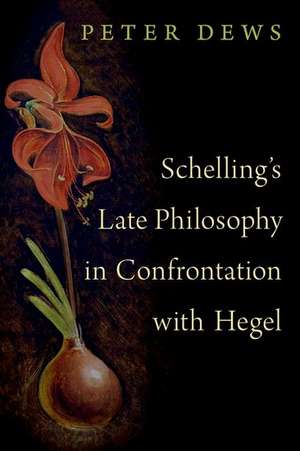Schelling's Late Philosophy in Confrontation with Hegel
Autor Peter Dewsen Limba Engleză Hardback – 9 feb 2023
Preț: 530.16 lei
Preț vechi: 757.93 lei
-30% Nou
Puncte Express: 795
Preț estimativ în valută:
101.45€ • 106.19$ • 84.44£
101.45€ • 106.19$ • 84.44£
Carte disponibilă
Livrare economică 26 februarie-04 martie
Livrare express 22-28 februarie pentru 125.37 lei
Preluare comenzi: 021 569.72.76
Specificații
ISBN-13: 9780190069124
ISBN-10: 0190069120
Pagini: 344
Ilustrații: 3 b/w illustrations
Dimensiuni: 237 x 163 x 29 mm
Greutate: 0.63 kg
Editura: Oxford University Press
Colecția OUP USA
Locul publicării:New York, United States
ISBN-10: 0190069120
Pagini: 344
Ilustrații: 3 b/w illustrations
Dimensiuni: 237 x 163 x 29 mm
Greutate: 0.63 kg
Editura: Oxford University Press
Colecția OUP USA
Locul publicării:New York, United States
Recenzii
For someone who is sufficiently familiar with the Hegelian line of thinking but always had difficulty in understanding the philosophical alternative created by his contemporary Schelling, this book is a long-awaited stroke of luck. With enormous lucidity, clarity, and elegance its author, Peter Dews, succeeds in reconstructing step by step the philosophical arguments that allow Schelling to depart from Hegel's system to develop his own notion of the dialectics of human freedom. At the end of this long and thrilling journey through Schelling's oeuvre, one uncomfortably starts to wonder whether one's own intuitions concerning the place of reason within history are not better harbored by Schelling than by Hegel. Is there a better argument for the intellectual value of a book than its power to make one reconsider one's own cherished assumptions and beliefs?
Schelling was famously called the great Proteus of philosophy. So numerous and diverse are the philosophical systems he developed in rapid succession that his philosophical position seems in constant flux, almost impossible to pin down. From the scattered building blocks of Schelling's neglected late philosophy, Dews now derives an astonishing and compelling account of Schelling's overall project that gives it clear definition and edge. Dews shows that Schelling provides us with a form of absolute idealism that should be considered as the most serious competitor to Hegel's: an absolute idealism beyond the Idea.
Dews shows that Schelling provides us with a form of absolute idealism that should be considered as the most serious competitor to Hegel's: an absolute idealism beyond the Idea.
With enormous lucidity, clarity, and elegance its author, Peter Dews, succeeds in reconstructing step by step the philosophical arguments that allow Schelling to depart from Hegel's system to develop his own notion of the dialectics of human freedom.
It is clear that, in the wake of this tremendously lucid presentation, our understanding of German Idealism has received a powerful new impetus.
Schelling was famously called the great Proteus of philosophy. So numerous and diverse are the philosophical systems he developed in rapid succession that his philosophical position seems in constant flux, almost impossible to pin down. From the scattered building blocks of Schelling's neglected late philosophy, Dews now derives an astonishing and compelling account of Schelling's overall project that gives it clear definition and edge. Dews shows that Schelling provides us with a form of absolute idealism that should be considered as the most serious competitor to Hegel's: an absolute idealism beyond the Idea.
Dews shows that Schelling provides us with a form of absolute idealism that should be considered as the most serious competitor to Hegel's: an absolute idealism beyond the Idea.
With enormous lucidity, clarity, and elegance its author, Peter Dews, succeeds in reconstructing step by step the philosophical arguments that allow Schelling to depart from Hegel's system to develop his own notion of the dialectics of human freedom.
It is clear that, in the wake of this tremendously lucid presentation, our understanding of German Idealism has received a powerful new impetus.
Notă biografică
Peter Dews taught philosophy at the University of Essex for several decades before becoming Emeritus Professor in 2018. He has also held visiting positions in the United States, Germany, and Brazil. He has published widely on modern French philosophy, the Frankfurt School, and the major thinkers of German Idealism.
